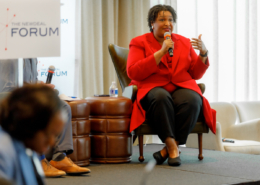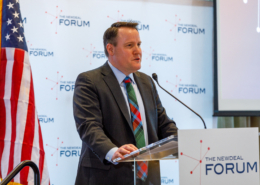Georgia Dems consider shifting focus from culture war issues at center-left summit
By Ross Williams | Georgia Recorder
How should Georgia Democrats deal with sensitive topics like transgender rights and diversity, equity and inclusion?
Georgia Democrats are thinking about the path forward as they look ahead to the 2026 midterms, hoping that discontent with President Donald Trump and his fellow Republicans will help propel Sen. Jon Ossoff back to Washington and launch a Democrat into the governor’s office for the first time since Roy Barnes served more than 20 years ago.
Other top executive offices like lieutenant governor, attorney general and secretary of state will also be up for grabs, as will 236 seats up and down the state Legislature.
A handful of Georgia Democratic leaders, including at least one candidate for governor, talked strategy Monday and Tuesday at the 2025 NewDEAL Ideas Summit in Atlanta, a conference for center-left Democrats at the state and local level from around the country.
On Tuesday, Atlanta Democratic Sen. Jason Esteves introduced Jim Kessler, executive vice president for policy at Third Way, a center-left think tank, for a presentation called “How Democrats Lost the Middle.”
“It’s weird, people really hate Donald Trump, but they really don’t like us either,” Esteves said. “So we need to figure out how to tread that line and make sure that people understand what we’re about, and how we can rebuild a durable Democratic (coalition). And Jim Kessler can do that.”
“How Democrats Lost the Middle”
Kessler started his presentation with statistics on the results from November’s presidential race, highlighting concerning trends for Democrats. Kessler said that of the 50 states plus Washington D.C., former Vice President Kamala Harris won 18 of the top 20 states with the highest per capita percentage of college degree holders, but lost in all but two of the bottom 31.
And while Democrats did well with white, college educated voters, they lost ground among voters of other ethnicities, particularly those without college degrees, making it more difficult to build a winning coalition in swing states like Georgia.
Kessler concluded with four key takeaways: “white and woke doesn’t win,” Latinos are beginning to vote more like white people, listen to voters and prioritize their desires over less immediate issues like mitigating climate change or preserving democratic norms and to mind the marriage gap – Harris lost married voters by 13 points, a wider gap than the gender gap, he said.
“The lesson here is we talk about kitchen table economics all the time, how families can balance the budgets and make ends meet, but there’s other subjects that are brought up at the kitchen table, too, that are family issues that I think Democrats have been absent on a lot of these cultural issues, but we have to be part of the solution of those kitchen table discussions as well.”
Tanya Miller, an Atlanta Democrat and House minority caucus chair, asked Kessler what those kitchen table issues were.
“I think they tend to be cultural issues,” he said. “I think there are things that people are talking about that they’re afraid to say publicly because they feel that they might get shouted at. I definitely think the trans issue is one of those in which people say, like, I feel like if I say the wrong word, I say the wrong pronoun. I’m walking on eggshells, and I think people are talking about stuff like that around the table.”
Kessler gave the example of the “Kamala is for they/them” ad run by now-President Donald Trump featuring a clip from a 2019 video in which Harris said she supported taxpayer-funded gender affirming surgery for inmates.
“If I had one piece of advice for Democrats, just one, it would be stop talking to the groups,” he said, referring to interest groups. “Stop answering the questionnaires, tear them up, and talk to people, and not the groups out there.”
Georgia Democrats react
Near the end of this year’s session, most House Democrats staged a walkout to protest the Republican emphasis on bills taking rights from transgender Georgians. The walkout took place during a vote on a ban for gender-affirming care for people locked up in state detention centers.
Democrats called the bill a ploy for votes at the expense of a marginalized group, argued that fewer than ten incarcerated people had even requested gender-affirming care and said denying medical treatment to incarcerated people could violate constitutional protections against cruel and unusual punishment.
When asked whether things like that walkout harm Democrats, Esteves, who was marked excused during the Senate vote on the prison gender care ban, indicated the party should emphasize other issues.
“I think Democrats should be focused on solving the issues that the state faces right now,” he said. “And we have a big affordability crisis. So we should be focused on keeping and bringing money into peoples’ pockets.”
Miller, who kicked off the House walkout with a speech criticizing the GOP focus on transgender issues, said Democrats have to walk a fine balance.
“The solution is not to ignore transgender issues,” she said. “Transgender people have the absolute human right to live, to live freely, to be who they are, to get the health care that they deserve, just like every Georgian, every Georgian has the right to do the exact same thing.
“At the same time, we have to stop playing – it’s a sort of a political dance,” she added. “We have to stop letting Republicans drag us into spaces and places where we can’t get our way out. And there is a pragmatism to this thing called politics, we’ve got to win the elections. Because if we’re sitting on the sideline as losers with no power, no ability to effect policy, no ability to protect the Georgians that we want to protect, then we’re just sitting at home alone, watching everything get destroyed.”
Atlanta Democratic Sen. Elena Parent, one of four Democrats who voted in favor of the trans inmate care ban, said the problem Democrats face is the perception that they care more about issues distant to a majority of people.
“You have to understand what their concerns are and then you can’t have them think that you’re more worried about some of these hot button issues and we’ll go to the mat on those and don’t really care about what’s really impacting the vast majority of people’s lives every single day.”






